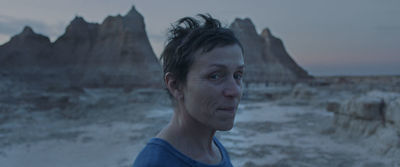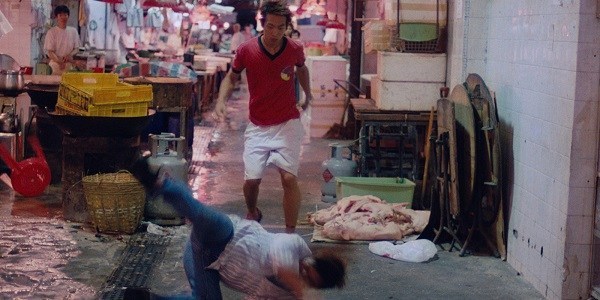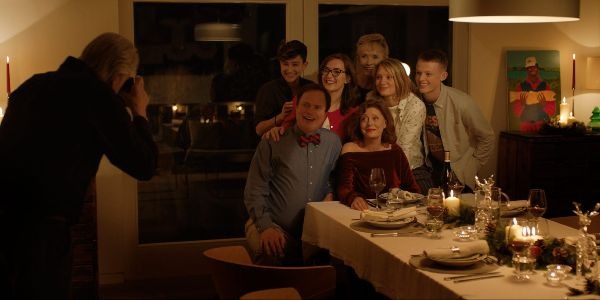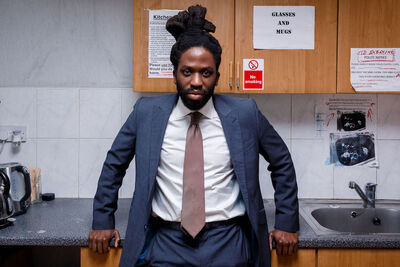Double Take: They Got ‘Constantine’ Right The First Time
Double Take is a series in which Anna Swanson and Meg Shields sit down and yell at each other about the controversial, uncomfortable, and contentious corners of cinema. In this edition, they consider whether the reputation of Constantine as a mediocre comic-book adaptation is deserved.
With remakes and reboots engulfing Hollywood, it’s easy to get the impression that originality is lacking. Indeed, there are very few instances where a retread is justified in order to improve or reinvigorate an already beloved film. But the once-maligned Constantine deserves a chance at redemption.
Francis Lawrence’s feature film debut was met with critical fire and brimstone when it premiered in 2005. Critics slung the phrase “spiritual shoot ‘em up” like that was a bad thing. They accused a neo-noir of being “dreary.” And they dismissed it as nothing more than a poor man’s version of The Matrix. They were, of course, wrong as hell.
The film follows John Constantine (Keanu Reeves), a freelance exorcist and marked cynic who’s as hard-boiled as they come. He’s been to Hell and back. Quite literally. And the experience left him with the ability to see Earth for what it really is: a battleground of heavenly and demonic gangsters, vying for control over the hearts, minds, and bodies of an unsuspecting humanity.
And so, Constantine does what he can, roaming the streets, with a persistent cigarette, doing his part knowing full well that he’s got a one-way ticket back to Hell when his time’s up.
Enter Rachel Weisz’s Angela, an LAPD detective determined to prove her twin sister Isabel’s fall from the roof of a mental hospital wasn’t a suicide, but rather proof of something far more sinister and supernatural. She teams up with the grizzled exorcist to discover who — or what — is responsible.
With talks of a sequel in the works and this year marking the sixteenth anniversary, what better time to revisit this unjustly dismissed genre masterpiece.
Meg Shields: I thought it might be fun for me to start by reading you the names of some films. They might be related…they might not be…
Anna Swanson: Ok
MS: Joe Dirt. The Hot Chick. Deuce Bigalow: European Gigolo. The Waterboy. The Dukes of Hazzard. Freddy Got Fingered. Catwoman. Thirteen Ghosts…Constantine.
AS: Is this a list of Razzie nominations?
MS: This is a list of Roger Ebert’s most hated films.
AS: Oh, wow.
MS: There’s an entire section of Ebert’s most hated list called “Hideous horror and science afflictions” that includes Constantine, The Village, Hellbound: Hellraiser 2, Resident Evil, Halloween III: Season of the Witch. You know, things that I think most people accept as being enjoyable if not straight-up good.
AS: Halloween III!
MS: Ebert’s not infallible, but I just wanted to use this to set up that there are people who lump Constantine in with the worst horror/sci-fi ever made. And I think ultimately what we want to do here, for the film’s anniversary, is engage with this criticism. Namely, because we disagree with it.
AS: Yeah Constantine can drive now, it’s sixteen, so it’s time to revisit. What was your experience with the film prior to us rewatching this recently?
MS: I’ve never read Hellblazer, the comic the film is based on. But honestly, I think going in blind has its perks because some fans took issue with the deviations. He’s not from Liverpool, he isn’t blonde. And coming into it fresh means you don’t have the expectations of what an adaptation of the comic books should be.
AS: Constantine is supposed to be from Liverpool? Ok, so, we need to change our position here, because now I’m mad that I was robbed of hearing Keanu Reeves do a Scouse accent. I’ve changed my tune on this film.
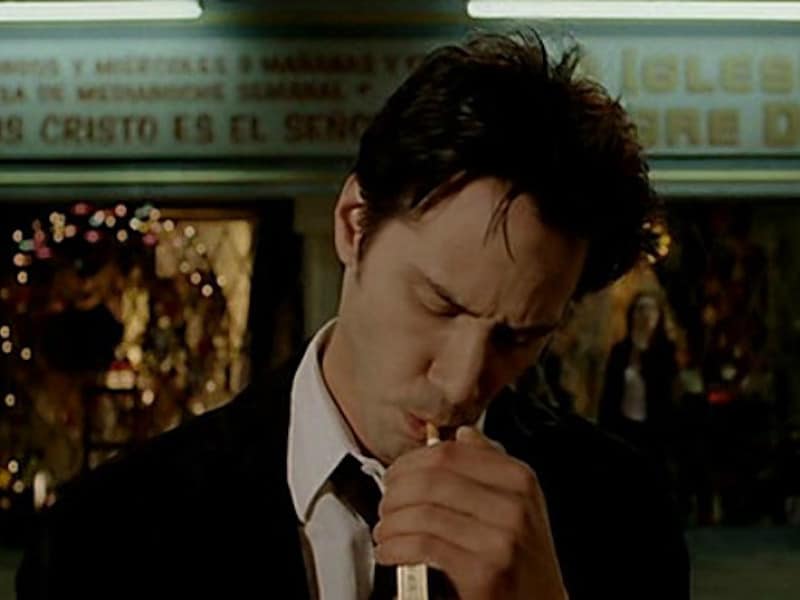
MS: They’re making a sequel. Maybe he’ll do this accent in the sequel. We can dream. But yes, people took issue with him not doing the accent. And this relates to the larger issue of Keanu’s casting. We’ll get to that later. In any case, I didn’t have a fixed idea in my mind of what to expect when I first watched this film. It was just a nice, fun, gothic movie for children.
AS: Except the film has an R rating.
MS: Right. And that definitely raises a question of “who is this movie for?”
AS: Us! I don’t remember much of my experience the first time I saw it. But it was definitely something up my alley as a preteen. I’m sure I enjoyed it at the time.
MS: This was around the same time as Hellboy and the “dark comic book movie” trend was in full swing. The year before Constantine‘s release, Catwoman came out.
AS: Yeah I think of this era as Uaviolet, Daredevil, Elektra, etc.
MS: Yeah the goths got hold of the computers. It was a testing ground for this idea of “how to adapt darker intellectual properties.”
AS: I’d also put Sin City here. All these mid-2000s comic book/graphic novel films that are markedly Not For Children.
MS: That’s the thing; you mention the “graphic novel” look. This was Lawrence’s debut film, but his background was in music videos.
AS: Oh, I see that! That makes sense!
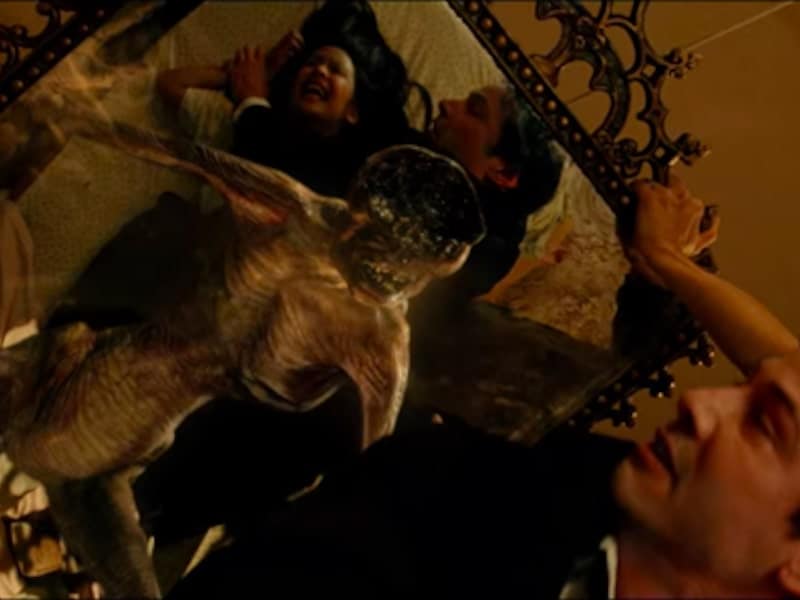
MS: During our rewatch, we were both struck by how good this film looks. Like, it actually looks like a comic book. There’s something very expressionistic and stylish about these films. Elements are explicitly composed within the frame to create the appearance of a comic book panel. There’s a shot I’m thinking of in the opening where Constantine has to exorcise a young girl. There’s a frame where he’s leaning above the camera and over the girl, and behind him, there’s a six-foot mirror that’s reflecting the demon. That’s all in one frame. It’s a lot of visual information, but it’s so interesting to look at. And it does a lot of work with respect to worldbuilding. Constantine doesn’t hold your hand. You just get dropped into this kooky Catholic world.
AS: It tells you at the beginning that the Sword of Destiny is missing and then an hour into the movie you learn what the Sword of Destiny is.
MS: Yeah exactly, so I think you’re right to say that this film is stylish in the way that Sin City is. Or Underworld. Or maybe even Catwoman to a degree. These are films that are trying to capture the feel of a comic book in a cinematic way. I was taken aback by how much this film has held up. And I think the film’s decision to lean harder on style is a big part of why it’s still interesting, visually.
AS: I think it takes a lot from expressionism, the way it works with light and dark.
MS: It’s working very confidently within a dark, morose film noir space. And that’s something that critics kept bringing up as a negative.
AS: It makes sense, though. He’s playing a Humphrey Bogart-type, that archetype of a hard-boiled film noir detective, just in a very supernatural world.
MS: Maybe this is a good time to talk about Keanu’s performance. He’s coming into this film with a lot of baggage. He’d just released the two Matrix sequels, which were met with a certain amount of disdain. So his star was on the decline and then this film came out. A lot of people compared it to The Matrix, which is an unfair thing to do. These films have very little in common other than they star the same person. At this time, people weren’t picking up what Keanu was putting down. The memory of the Matrix sequels affected how they regarded this film. Reviews said that, literally, any other actor would have done this role justice better than him. They didn’t get what he was doing at all. Which is crazy because this is, beat for beat, the same thing he does in John Wick!
AS: Yeah, that’s true. This movie and this performance feel more in line with Keanu now than Keanu in the ’90s, where I think of movies like Point Break and Speed. They’re two distinct eras of different action heroes.
MS: Watching this film in 2021, his performance makes sense and it’s in line with what he’s praised for now. Whereas you see critics in 2005 dragging him for being detached. And it’s like: that’s the character. That was a choice. It’s like they couldn’t see past the cultural disdain for aloof Keanu. The similarities to John Wick, which was critically lauded, are uncanny, from Keanu’s performance to worldbuilding, to the fact that there’s this underground, organized network of gangsters that the public isn’t aware of.
AS: Papa Midnite’s club is basically the Continental Hotel. Both are safe and neutral meeting spaces for opposing sides. I know between the two of us, I’m the one who really loves John Wick. You’re not as into the movies. But for me this really hit the John Wick spot. Watching Constantine basically feels like getting a fourth John Wick movie. Which is all I want.
MS: I want John Wick with demons. That’s why I like Constantine!
AS: I also think, and not even in an ironic way, that Keanu is good in this. He’s legitimately, sincerely good. I was scrolling through reviews on Letterboxd, and I was seeing people saying “I hated this underlit, badly acted movie,” and I’m like, did we watch the same movie?
MS: What’s that line from Lady Bird? “They didn’t understand it.”
AS: It has a very 2000s “look” to it that is different to how movies looked a decade before.
MS: But that’s exactly it! When you have smooth, clockable 2000s CGI in your movie, you cover it up in darkness. The darkness in Constantine wasn’t an accident, it was a stylistic choice and it was the smart move! And I never found it too dark in the way where I couldn’t tell what was going on.
AS: Yeah, it’s set at night, not poorly lit. There’s a difference.
MS: Compared to the current landscape of comic book movies, this feels so much weirder and unique than any Marvel movie. Even the better ones feel visually and thematically boring compared to this, in my opinion.
AS: I was thinking about that and how this movie is rated R. The conversation around the upcoming Justice League Snyder Cut as an R-rated superhero movie feels almost forced. Whereas this just feels organic. Like, yeah, of course, this movie about demon hunting is rated R. It doesn’t feel like a choice done just to be edgy.
MS: And jumping off what you said about Keanu’s performance, this whole film is very sincere. This is a theological, action, horror, neo-noir. I can’t think of a recent movie from Marvel or DC that has as interesting a premise, genre-wise.
AS: So, Catwoman comes out before Constantine and it flops. Then Constantine comes out in February. And the following spring we get the first Nolan Batman movie.
MS: I’m not writing off DC. I think Shazam! is interesting. But in many ways Shazam! feels very Marvel-y, in that it’s safe. It’s still a good movie. But I don’t feel that it’s risky in the same way that Constantine is. And I feel like Batman Begins comes out and defines what DC does moving forward. Because lest we forget, Constantine is a DC movie, technically. But it feels like: Constantine comes out, doesn’t make money, gets a very mixed-to-negative critical response. Then Batman Begins comes out and sets the groundwork for what DC films are about: you take a well-known IP, you play it straight, and then you profit, theoretically.
AS: Yeah.
MS: Constantine is the gravestone of DC playing a style game as opposed to a gritty game.
AS: That tracks for me. ‘Cause it’s also that there is a real earnestness to it.
MS: Yeah, one of the bigger words in the word cloud of this film’s critical reception is “cynical.” And it’s like, no. You’re describing a character, not a film. The film itself is very sincere.
AS: There’s a line near the end of the film where Constantine is at the end of his life and talking to God and he says: “I know I’m not one of your favorites. I know I’m not welcome in your house. But I could use a little attention please.” There’s an emotional weight to what this character goes through that is not played up to be overwrought. He has a beat-for-beat well-written character arc.
MS: Something that comes up sometimes when you talk to people about Constantine is that they find the ending to be convoluted. This also comes up in a lot of reviews. And honestly, I don’t get it. What did they miss? What did I miss? One of the great tricks of the film is that it starts relatively grounded and then increasingly ramps up. So by the time you get to the ending, the cheesy moment where he turns around and gives the Devil the finger as he ascends to Heaven all makes sense to me. It’s justified. They worked for it.
AS: I think this is a good time to talk about performances. This film has great worldbuilding, it looks great, it’s doing interesting and unique things within its genre space. But one of the biggest things that make this film slap is the performances.
MS: Yes.
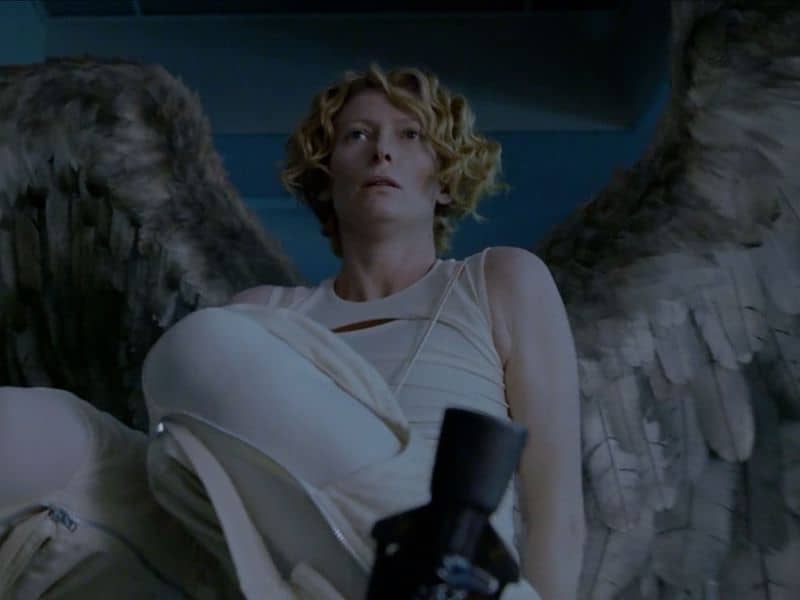
AS: The casting is excellent. You’ve got Keanu and Rachel Weisz, who’ve never not been at the top of their game but are definitely at the top of their game. This is such a good era for them. And then the supporting cast. Tilda Swinton? Magnificent.
MS: Yeah, like an androgynous, duplicitous angel. Who do you cast for that? You cast Tilda.
AS: I saw a review that said: “This is the only film where they didn’t have to digitally remove her wings.” It’s just the type of thing where if this came out now, with the exact same cast—and it could because it’s composed of a cast of people who have not aged—people would go nuts for it.
MS: People weren’t ready for Constantine.
AS: And I don’t even think that we’re saying that because of the fatigue of what’s happened over the last like ten years in superhero or comic book movies.
MS: No, but it definitely clarifies things in hindsight. Also, while we’re talking about performances, we have to shout out Peter Stormare, one of the best, if not the best, on-screen portrayals of Satan. It’s immaculate: a snarling, petty mob boss who’s lost control of his son. Decked out in a white suit, which we associate with cinematic depictions of God, but he’s just like covered in tar underneath it all. That man is on screen for like, not that long, but every second is magic. It’s one of the best genre performances, period. Pruitt Taylor Vince as the disturbed priest who drinks himself to death is also amazing. I can’t think of a bad performance in this film. And that’s usually something that defines bad early 2000s genre films.
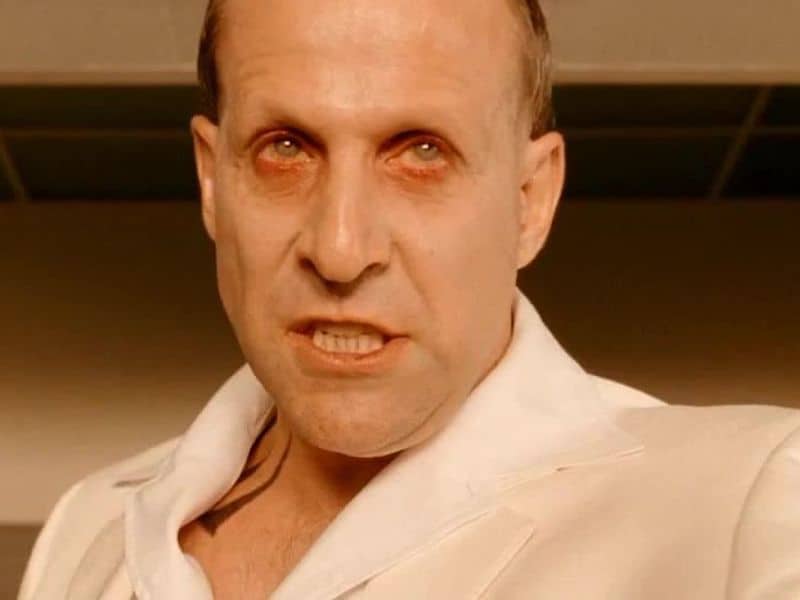
AS: This feels like everyone is on the same wavelength. Everyone is committed to the bit of angels and demons as mob bosses and assassins. Which is great.
MS: Stormare is probably the most bonkers performance in Constantine. By a long shot. But by the time you get to him, you’ve been given the context to understand why a character like that would exist in this world.
AS: It’s also not so crazy that it stands out. It still tracks.
MS: No, it only stands out because it’s a top-shelf, unimpeachable genre performance. This film’s 47% score on Rotten Tomatoes was a shock to me. Like, when it premiered, Constantine came in second at the box office after Hitch in its second week.
AS: I do love that it was a Valentine’s release.
MS: I genuinely think the critical backlash to Keanu is the key to why this film failed. I know there are some critics who take issue with perceived plot holes. For instance, a police officer going along with all this supernatural stuff…
AS: But the film does take care to paint the world they’re in. I think of when Angela meets Constantine and she says: “Oh, I got your name from the guys at the station. They say you specialize in exorcisms.” Like that’s the world we’re working with. The cops are in conversation with exorcists. This is a supernatural, heightened, more theological version of our world. It has different rules.
MS: A thing you see come up time and time again in the negative reviews is people not being able to reconcile the tone. They accuse it of being a downer in that it’s dark and theological. Others accuse it of being silly and flippant. They seem to want the film to pigeonhole itself when the fact is it has its feet in a couple of different pots of water.
AS: A movie where a man flips off Lucifer is not taking itself too seriously.
MS: Exactly.
AS: One of my things with superhero and comic book movies is that I don’t think “comic book movie” should be a genre unto itself.
MS: Great point.
AS: The problem with modern-day saturation, with both Marvel and DC and whatever else, is that “comic book movie” is treated as a genre. There’s no real interest in going beyond that. Whereas this, Constantine, is a comic book movie BUT it’s a neo-noir supernatural thriller. It’s working with its own genre rules and conventions and stylistic markers in a way that’s beyond the fact that it’s adapted from a comic book.
MS: I can’t believe I’m about to say this, but this is why it’s frustrating to see something like Joker be critically well-met, where people are like: “oh, it’s a comic book movie, but it’s actually a ’70s counterculture film. Isn’t that a wild concept?!” They’re just describing something that other, older, comic book movies have already done. We’ve had the blueprint this whole time. But some of those blueprints were a little too weird for people, or whatever.
AS: Joker is not as good as Constantine. But it is working in that same space of “we’re going to put a comic book character in a mode that already exists”. Constantine just did that with films of the ’40s rather than films of the ’70s.
MS: Which, obviously, comic books have been doing forever. That is a thing that comics do: transposing their characters into different genres and tones. This isn’t new. But when Constantine did it, it was poorly received. And I don’t have anything to base this on, but I do feel like the film playing in a theological sandbox gave people expectations that it was supposed to be a certain kind of way. Just like how they made up their minds about what a Keanu performance is. I don’t think they were hyper-religious and scandalized. But I wonder if they came into the film with an expectation of what something in this zone should be. Namely: that it shouldn’t be this playful. That’s a great word for describing Constantine: not silly, not goofy, playful. And I think they struggled with the fact that it’s playful and dark….
AS: …And R-rated but not gory or self serious.
MS: Anyway, Constantine rips.
AS: I’m sure there were people at the time who loved it. But I think those people were probably fourteen-year-old girls.
MS: Constantine is a film for girls. For sure.
AS: There was for sure a good reception; it just wasn’t among critics.
MS: I agree. I also just think theological, action-horror, neo-noir is so niche. And that kind of specificity can backfire and alienate. But still: Constantine is a good movie.
AS: Sorry, Roger Ebert.
MS: Everyone owes Constantine an apology and there’s no greater evidence of this than Rotten Tomatoes publishing a blog post titled: We Owe Constantine An Apology.
AS: Good. They’re learning.
MS: Rarely do I get behind re-treads and revamps. But they’re getting the gang back together for Constantine. And because that film got such a raw deal in 2005, I think this is a rare instance of a film deserving a second chance. I hope people are ready for it this go-round.
AS: Theological John Wick.
MS: Five stars.

